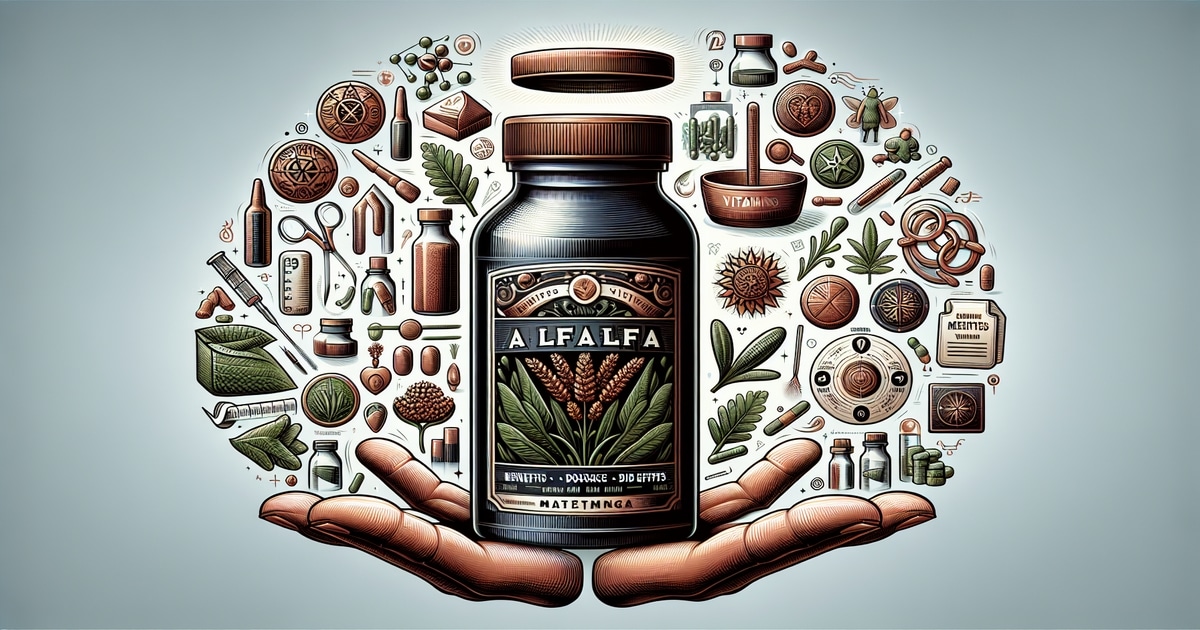Key Takeaways
-
Incorporate alfalfa and herbal supplements into your diet: Add alfalfa to your meals or consume it to benefit from its essential nutrients, health benefits, and plant compounds.
-
Consider using alfalfa, a herbal supplement, to support metabolic and reproductive health, as it offers potential benefits.
-
Alfalfa may aid in managing menopause symptoms and reducing high cholesterol levels, offering a natural alternative for these conditions.
-
Harness its antioxidant effects and inflammation reduction: Leverage the antioxidant properties of alfalfa to reduce inflammation in the body, potentially contributing to overall health and well-being.
-
Be mindful of safety precautions and side effects: Prioritize safety by being aware of common side effects and precautions associated with alfalfa consumption, especially if you have specific health conditions or are taking medications.
-
Consult with a healthcare professional before incorporating alfalfa into your routine to understand potential medication interactions and determine the optimal dosage for your needs.
Curious about the benefits of alfalfa vitamins? This blog post will explain why they’re good for you. We’ll discuss their nutrients, health benefits, and how they can help you stay healthy. Whether you want to improve your overall health or address specific issues, this guide will give you tips on using alfalfa vitamins.
Essential Nutrients and Nutrition Facts of Alfalfa
Rich in Essential Nutrients
Alfalfa contains essential nutrients, including vitamin K, calcium, and magnesium. These nutrients are crucial for maintaining healthy bones, supporting blood clotting, and regulating muscle function. For instance, vitamin K aids blood clotting and bone metabolism, while calcium is essential for strong bones and teeth.
Alfalfa also contains various vitamins, such as vitamins C, E, and B. These vitamins play key roles in supporting the immune system (vitamin C), acting as antioxidants (vitamin E), and aiding energy production (B vitamins).
Good Source of Protein, Fiber, and Antioxidants
In addition to its rich vitamin content, alfalfa is a good source of protein, fiber, and antioxidants. The protein content in alfalfa supports the growth and repair of body tissues, while the dietary fiber helps maintain a healthy digestive system by promoting regular bowel movements.
Moreover, antioxidants in alfalfa leaves help protect cells from damage caused by free radicals. This can contribute to reducing oxidative stress within the body.
Alfalfa Benefits for Metabolic and Reproductive Health
 Metabolic Health Support
Metabolic Health Support
Alfalfa vitamins are essential for supporting metabolic health. This plant is rich in vital nutrients such as vitamins, minerals, and antioxidants. These nutrients play a crucial role in maintaining the body’s metabolic functions. For instance, the high concentration of vitamin K in alfalfa can aid in regulating blood sugar levels, which is beneficial for overall metabolic health.
Moreover, the presence of phytoestrogens in alfalfa offers potential benefits for reproductive health in women. These phytoestrogens, plant-derived compounds that mimic the hormone estrogen, may help regulate hormonal balance and alleviate symptoms associated with hormonal fluctuations.
Reproductive Health Benefits
Research has indicated that consuming alfalfa may contribute to balancing hormones related to reproductive health. In particular, studies have suggested that these phytoestrogens could potentially support women’s reproductive well-being by helping to manage menstrual irregularities or menopausal symptoms.
For example:
-
Studies on rats showed that alfalfa supplementation improved milk production and regulation of reproductive hormones.
-
Research has demonstrated that incorporating alfalfa into the diet reduces body weight gain, indicating its potential impact on hormonal balance and metabolic processes.
Managing Menopause Symptoms and High Cholesterol with Alfalfa
Managing Hot Flashes
Alfalfa may help alleviate menopausal symptoms such as hot flashes. Some studies suggest that the plant’s phytoestrogens could mimic estrogen’s effects in the body. This could lead to a reduction in the frequency and intensity of hot flashes experienced by women going through menopause.
Alfalfa has lots of fiber, which can help control cholesterol levels. The fiber can lower how much cholesterol the body absorbs, which can keep the heart healthy. Eating alfalfa might help improve heart health by lowering cholesterol.
Supporting Heart Health
The potential cholesterol-lowering effects of alfalfa could benefit heart health by helping manage high cholesterol levels and promoting healthy lipid profiles. Research suggests that consuming alfalfa regularly may reduce low-density lipoprotein (LDL) or “bad” cholesterol, decreasing the risk of developing heart disease.
Antioxidant Effects and Inflammation Reduction Using Alfalfa
Antioxidant Properties
Alfalfa is rich in antioxidants such as flavonoids, which can combat oxidative stress by neutralizing harmful free radicals. These compounds act as radical scavengers, protecting the body’s cells from damage caused by oxidative stress. Regular consumption of alfalfa can reduce oxidative stress, benefiting overall health.
Alfalfa’s antioxidant effects extend to its potential to decrease lipid peroxidation and protect the liver tissue from damage. By increasing the body’s antioxidant capacity, alfalfa helps maintain healthy liver function and supports the immune system.
Anti-Inflammatory Effects
Certain compounds in alfalfa may possess anti-inflammatory properties that could aid in reducing inflammation within the body. This has implications for conditions like rheumatoid arthritis and lupus erythematosus, where inflammation plays a significant role.
By incorporating alfalfa into one’s diet or consuming it as a supplement, individuals may experience a decrease in inflammation levels over time. This reduction in inflammation supports joint health and contributes to overall well-being.
-
Alfalfa’s antioxidants combat oxidative stress.
-
Flavonoids act as radical scavengers against free radicals.
-
Regular consumption reduces lipid peroxidation and protects liver tissue.
-
Compounds in alfalfa have potential anti-inflammatory effects.
-
Consumption may lead to decreased inflammation levels over time.
Safety Precautions and Common Side Effects of Alfalfa Consumption
Digestive Discomfort
Some individuals may experience digestive discomfort when consuming alfalfa. This can manifest as bloating, gas, or diarrhea. It’s important to start with small amounts to gauge your body’s reaction before increasing the intake.
Consuming alfalfa in excessive amounts might lead to stomach upset, so it’s crucial to be mindful of your portion sizes. If you notice any symptoms of digestive discomfort after consuming alfalfa, it’s advisable to reduce the intake or consult a healthcare professional.
Autoimmune Conditions
People with autoimmune conditions should use caution when consuming alfalfa due to its immune-stimulating effects. Alfalfa contains certain substances that may stimulate the immune system, potentially exacerbating autoimmune conditions such as rheumatoid arthritis or lupus.
Individuals with autoimmune conditions must consult their healthcare provider before incorporating alfalfa into their diet. By doing so, they can ensure that the consumption of this nutrient-rich plant does not adversely affect their health.
Pregnancy Risks
Pregnant women should not eat too much alfalfa because it has a lot of vitamin K. Having too much vitamin K during pregnancy can mess with some medicines and cause problems with blood clotting. Pregnant women should get their vitamins from a balanced diet and talk to their doctor before making any changes.
Interactions of Alfalfa with Medications and Other Substances
Potential Interactions
Alfalfa supplements can interact with certain medications, such as blood-thinning drugs like warfarin. This interaction may increase the risk of bleeding, making it crucial for individuals in this group taking these medications to be cautious when consuming alfalfa vitamins. Moreover, hormone medications may also interact with alfalfa due to its plant compounds.
It’s important to talk to a doctor before taking alfalfa with some medicines and nicotine. This can help make sure it’s safe and won’t cause bad effects on your body. People getting treatment and taking medicine should know how alfalfa and nicotine might affect them.
Consultation with Healthcare Professionals
Consulting a healthcare professional is imperative before administering or consuming alfalfa with prescribed medications. The consultation aims to provide personalized guidance based on an individual’s medical history and current drug regimen. This proactive approach helps identify potential risks of combining medications, alfalfa, and vitamins.
-
Individuals taking blood-thinning medications should exercise caution when considering alfalfa supplementation.
-
Hormone medication users need to be mindful of potential interactions between their prescription drugs and alfalfa.
-
Consulting a healthcare professional before combining specific drugs with alfalfa and liver is vital for ensuring overall well-being.
Recommended Usage and Optimal Dosage of Alfalfa
Individualized Dosages
The recommended dosage can vary based on individual needs. Following the supplement manufacturer’s or healthcare provider’s instructions is important. The dosage may also depend on age, health condition, and specific nutritional requirements.
Alfalfa supplements are available in different forms, including tablets, capsules, and powders. The dosages for these forms may differ based on their concentration and formulation. For instance, due to potency variations, a standard alfalfa tablet might have a different dosage recommendation than an alfalfa powder.
Gradual Increase for Assessment
To determine the optimal dose of alfalfa vitamins, individuals should start with a lower dosage and gradually increase it while assessing tolerance and effectiveness. This approach allows them to observe any potential side effects or benefits of different doses.
Moreover, considering body weight ratio is crucial when determining the appropriate alfalfa supplements. Individuals with higher body weights may require slightly larger doses than those with lower weights. However, all individuals need to consult a healthcare professional before adjusting their use of alfalfa supplements based on their body weight ratio.
Proper Storage and Quality Sources of Alfalfa Supplements

Storage Guidelines
Proper storage is crucial. Store alfalfa supplements in a cool, dry place away from direct sunlight to maintain potency. Exposure to heat and light can degrade the quality of the supplements. Ensure the container is tightly sealed to prevent moisture from affecting the product.
It’s important to note that distilled water should not be used when storing alfalfa supplements as it may introduce moisture into the container. Instead, opt for a dry environment with low humidity levels.
Choosing Quality Sources
Selecting reputable brands or sources known for their commitment to quality control and purity is essential when purchasing herbal supplements like alfalfa vitamins. Look for established companies with a track record of producing high-quality products.
Furthermore, checking for third-party testing or certifications can assure the authenticity and purity of the supplement. This ensures you get a reliable product free from contaminants or impurities.
Final Remarks
Alfalfa is undeniably a nutritional powerhouse, offering many essential nutrients and potential health benefits. Alfalfa is good for your body in many ways. It helps with metabolism, reproduction, and reducing inflammation. But be careful because it can interact with some medications. Store and buy it properly to use it wisely and feel better.
For those considering integrating alfalfa into their dietary regimen, consulting a healthcare professional is recommended to ensure its compatibility with individual health conditions and medications. Staying informed about reputable sources and optimal usage can maximize the benefits while minimizing risks associated with alfalfa consumption.
Frequently Asked Questions
Is alfalfa a good source of essential nutrients?
Yes, alfalfa is a rich source of essential nutrients such as vitamins A, C, E, and K, as well as minerals like calcium and magnesium. It also contains chlorophyll and various antioxidants that contribute to its nutritional value.
Can alfalfa help in managing menopause symptoms?
Alfalfa may help manage menopause symptoms due to its phytoestrogen content, which can mimic the effects of estrogen in the body. However, it’s important to consult with a healthcare professional before using it for this purpose.
Are there any safety precautions to consider when consuming alfalfa?
Some individuals may experience side effects such as bloating or diarrhea when consuming alfalfa. People with certain conditions like autoimmune disorders should avoid alfalfa due to potential interactions.
How should I store my alfalfa supplements properly?
Store your alfalfa supplements in a cool, dry place away from direct sunlight and moisture to maintain the quality of your alfalfa supplements. Always follow the storage instructions provided on the product packaging for best results.
What are some common interactions of alfalfa with medications and other substances?
Alfalfa may interact with blood thinners or anticoagulants due to its vitamin K content, which can affect blood clotting. You must inform your healthcare provider about any supplements you’re taking before starting new medications.

